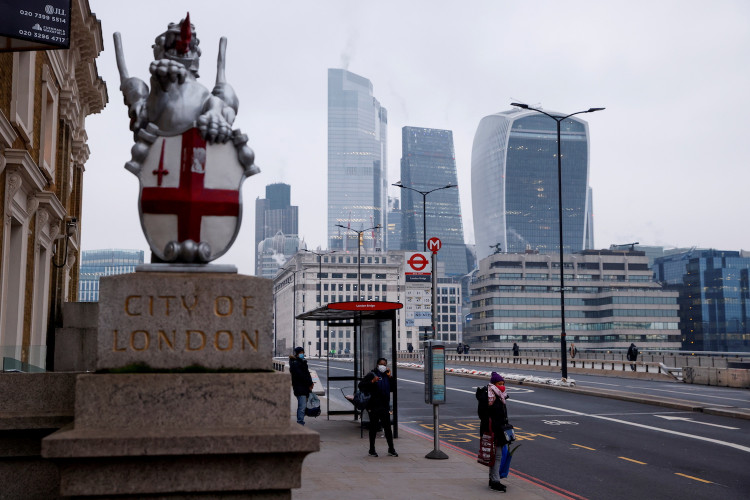Amid cooling inflation in August, the door has opened for the Bank of England to pause its rate hikes.
On Wednesday, data from the UK's Office for National Statistics revealed that the UK's Consumer Price Index (CPI) for August rose by 6.7% year-on-year, lower than the previous 6.8% and below analysts' expectations of 7%. This marks the lowest level in 18 months.
Excluding food and fuel, the core CPI also saw a significant drop from its previous 6.9% to 6.2%, while inflation in the services sector declined from 7.4% to 6.8%.
Following the data release, the British pound weakened, and UK bond yields fell. The pound dropped 0.5% to its weakest level since May, and the yield on two-year UK bonds fell to 4.298%.
Swap markets indicate that traders now see a 50% chance of the Bank of England raising rates by 25 basis points on Thursday, down from the previous 80%.
Significant Slide in Services Inflation
The persistent inflation in services saw a notable decline, moving from 7.4% to 6.8%. The UK's Office for National Statistics attributed the drop in inflation mainly to decreases in hotel and airfare prices, which tend to be volatile, and a slower rise in food prices compared to the same period last year.
Additionally, despite rising oil prices pushing up this month's production input and output prices, price pressures continue to ease. Compared to the same period last year, the costs of fuel and raw materials fell by 2.3%, while factory gate prices dropped by 0.4%.
This data comes as a relief for the UK, which has been grappling with the most severe inflation issues among the G7 nations for months. While the European Central Bank and the Federal Reserve have hinted that their tightening cycles might be ending, the Bank of England has had to emphasize its commitment to curbing prices.
To control inflation, the Bank of England has hiked rates 14 times consecutively since December 2021, raising the benchmark rate to 5.25%. Due to stubborn core and services inflation, the market had previously bet on another 25 basis point rate hike by the Bank of England this Thursday, which would bring the benchmark rate to 5.50%.
Focus on Tomorrow's Rate Decision
On Thursday at 7 p.m. Beijing time, the Bank of England will announce its interest rate decision. The unexpectedly cooled inflation has reduced the likelihood of another rate hike, leading to mixed opinions among analysts.
Kitty Ussher, former finance minister and current Chief Economist at the UK Directors Association, suggested that the ongoing rate hike policy is starting to take effect. The Bank of England should allow more time for this policy to work rather than hastily raising the benchmark rate further.
Goldman Sachs pointed out that due to the unexpected drop in inflation, investors have lowered their expectations for a rate hike by the Bank of England this week, suggesting that UK interest rates might have peaked.
Dan Hanson and Ana Andrade from Bloomberg Economics believe that the significant drop in the UK's August CPI increases the risk of the Bank of England not raising rates this week. Overall, they think that wage growth momentum is enough to concern the central bank. However, if the bank believes this month's action will be the last in this tightening cycle and the decline in core inflation is lasting, then the possibility of a rate hike in November will vanish.
Geoff Yu, a strategist for Europe, the Middle East, and Africa at BNY Mellon, anticipates that the Bank of England will follow the European Central Bank's lead and raise rates one last time this week. This could be seen as a "dovish hike," and the soft CPI data for August further solidifies this view.
However, Alpesh Paleja, Chief Economist at the Confederation of British Industry (CBI), stated that despite the recent decline, the Bank of England remains concerned about persistent domestic price pressures. Therefore, the likelihood of another rate hike tomorrow remains significant, although monetary policy changes will be highly data-dependent.
Paul Dales, Chief UK Economist at Capital Economics, still believes that the Bank of England will raise rates by 25 basis points tomorrow, although the risks of unchanged rates and rates having peaked have slightly increased.
Yael Selfin, Chief Economist at KPMG UK, noted that oil prices have risen by 25% since June, implying that inflation will slow down gradually. Therefore, the Monetary Policy Committee might still support a rate hike.
The Real Challenge: Reducing Inflation from 4% to 2%
While the lower-than-expected inflation data for August might please decision-makers at the Bank of England, economists warn that it's too early to celebrate.
Melissa Davies, Chief Economist at Red Atlantic, said that with oil prices rapidly rising in September, we can expect monthly CPI increases to do little to slow the overall CPI deceleration.
Stepping back, the UK's inflation rate remains too high. Still, it will continue to slow by the end of the year, and the real challenge for the Bank of England will be to reduce inflation from 4% to the 2% target.
In a statement, UK Finance Minister Jeremy Hunt said that the plan to address inflation is working, but the inflation rate remains too high. Therefore, it's even more essential to stick to the plan to halve inflation, relieving pressure on households and businesses, which is also the only way to achieve sustainable higher growth.






